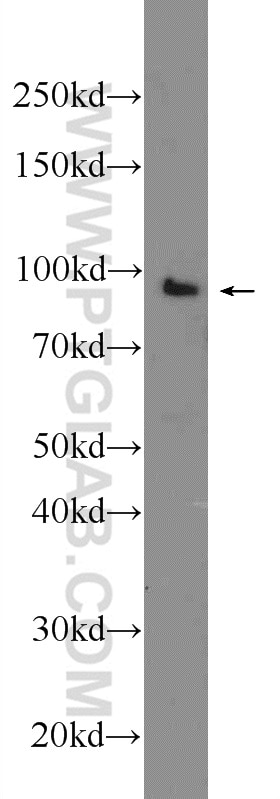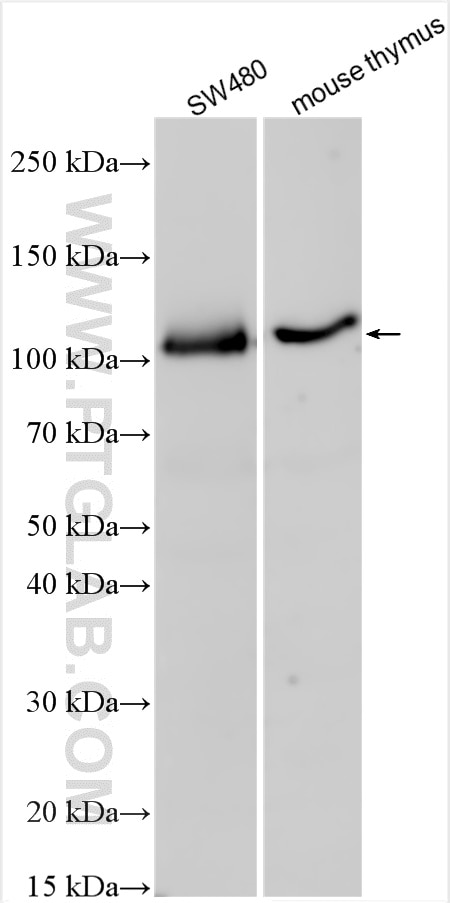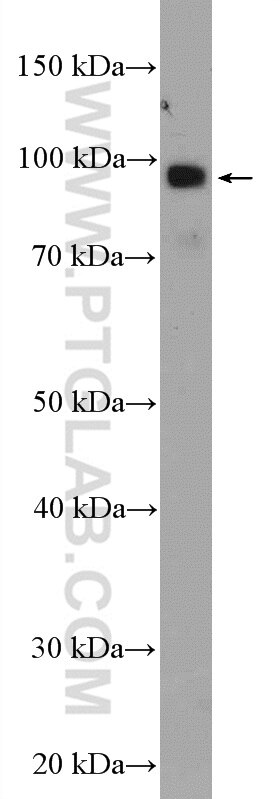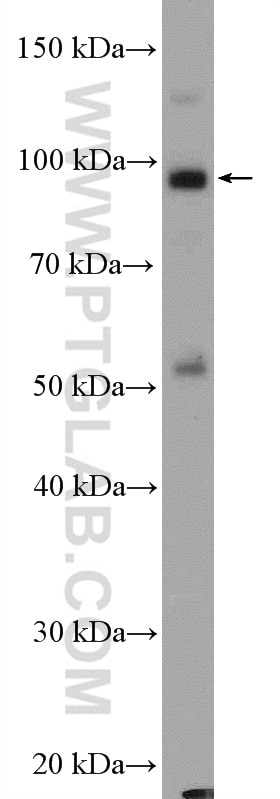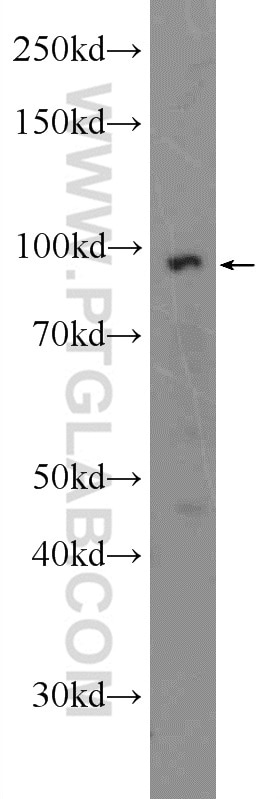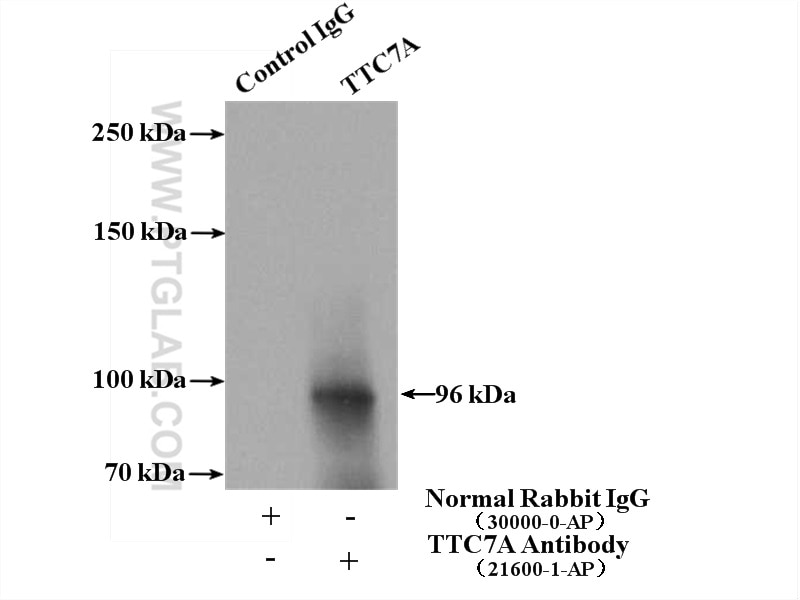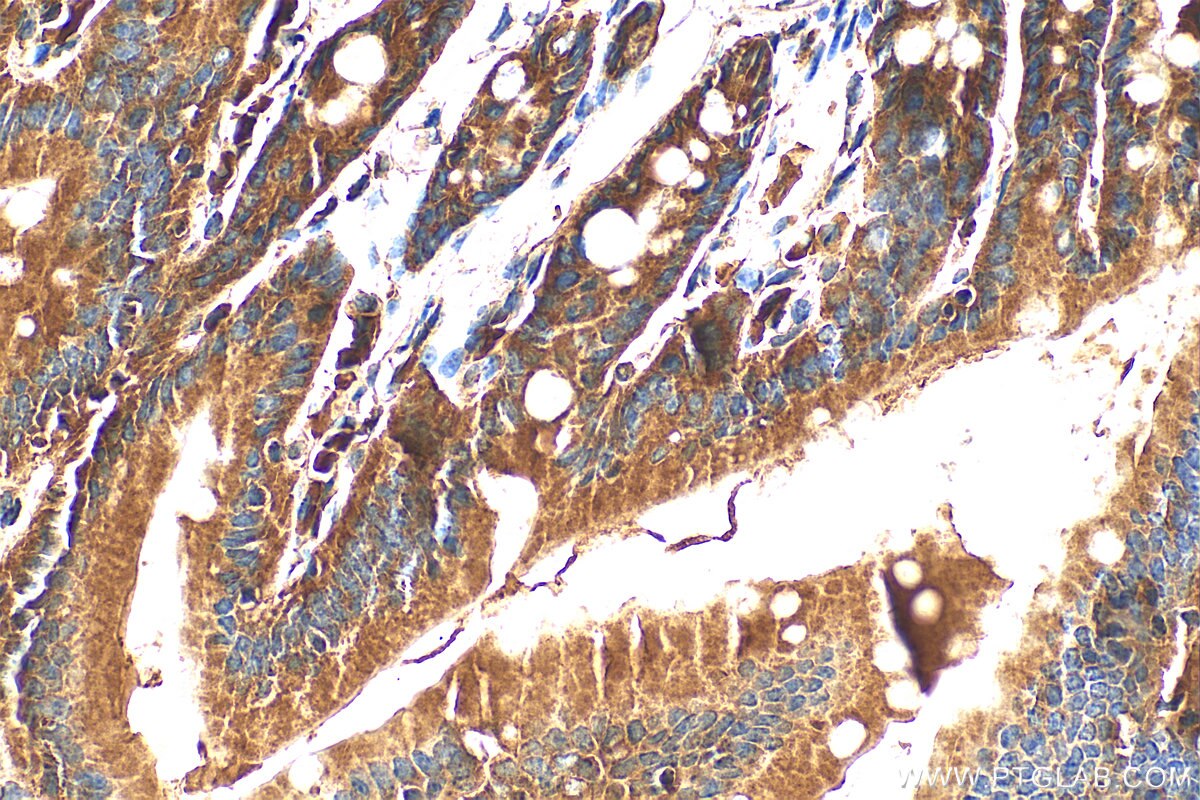Anticorps Polyclonal de lapin anti-TTC7A
TTC7A Polyclonal Antibody for WB, IHC, IP, ELISA
Hôte / Isotype
Lapin / IgG
Réactivité testée
Humain, souris
Applications
WB, IHC, IF, IP, ELISA
Conjugaison
Non conjugué
N° de cat : 21600-1-AP
Synonymes
Galerie de données de validation
Applications testées
| Résultats positifs en WB | cellules SW480, cellules K-562, cellules PC-3, tissu de côlon de souris, tissu de thymus de souris, tissu d'intestin grêle de souris |
| Résultats positifs en IP | cellules K-562 |
| Résultats positifs en IHC | tissu d'intestin grêle de souris, il est suggéré de démasquer l'antigène avec un tampon de TE buffer pH 9.0; (*) À défaut, 'le démasquage de l'antigène peut être 'effectué avec un tampon citrate pH 6,0. |
Dilution recommandée
| Application | Dilution |
|---|---|
| Western Blot (WB) | WB : 1:500-1:3000 |
| Immunoprécipitation (IP) | IP : 0.5-4.0 ug for 1.0-3.0 mg of total protein lysate |
| Immunohistochimie (IHC) | IHC : 1:50-1:500 |
| It is recommended that this reagent should be titrated in each testing system to obtain optimal results. | |
| Sample-dependent, check data in validation data gallery | |
Applications publiées
| WB | See 1 publications below |
| IHC | See 3 publications below |
| IF | See 1 publications below |
Informations sur le produit
21600-1-AP cible TTC7A dans les applications de WB, IHC, IF, IP, ELISA et montre une réactivité avec des échantillons Humain, souris
| Réactivité | Humain, souris |
| Réactivité citée | Humain |
| Hôte / Isotype | Lapin / IgG |
| Clonalité | Polyclonal |
| Type | Anticorps |
| Immunogène | TTC7A Protéine recombinante Ag16212 |
| Nom complet | tetratricopeptide repeat domain 7A |
| Masse moléculaire calculée | 858 aa, 96 kDa |
| Poids moléculaire observé | 96 kDa |
| Numéro d’acquisition GenBank | BC114365 |
| Symbole du gène | TTC7A |
| Identification du gène (NCBI) | 57217 |
| Conjugaison | Non conjugué |
| Forme | Liquide |
| Méthode de purification | Purification par affinité contre l'antigène |
| Tampon de stockage | PBS with 0.02% sodium azide and 50% glycerol |
| Conditions de stockage | Stocker à -20°C. Stable pendant un an après l'expédition. L'aliquotage n'est pas nécessaire pour le stockage à -20oC Les 20ul contiennent 0,1% de BSA. |
Informations générales
TTC7A (TPR repeat protein 7A) is expressed in enterocytes within the duodenum, ileum, and colon, and has a role in enterocyte survival and function. Mutations in the TTC7A gene can result in a spectrum of intestinal disease, including multiple intestinal atresia (MIA) and very early onset inflammatory bowel diseases (VEOIBD). Functional analysis revealed that TTC7A binds to and facilitates the transport of PI4KIIIa from the trans-Golgi to the plasma membrane, while loss of TTC7A results in dysregulation of PI4KIIIa signaling. This antibody specially recognizes endogenous TTC7A. (24417819)
Protocole
| Product Specific Protocols | |
|---|---|
| WB protocol for TTC7A antibody 21600-1-AP | Download protocol |
| IHC protocol for TTC7A antibody 21600-1-AP | Download protocol |
| IP protocol for TTC7A antibody 21600-1-AP | Download protocol |
| Standard Protocols | |
|---|---|
| Click here to view our Standard Protocols |
Publications
| Species | Application | Title |
|---|---|---|
Gastroenterology Mutations in tetratricopeptide repeat domain 7A result in a severe form of very early onset inflammatory bowel disease. | ||
Front Immunol A Novel Homozygous TTC7A Missense Mutation Results in Familial Multiple Intestinal Atresia and Combined Immunodeficiency. | ||
J Clin Immunol Bialellic Mutations in Tetratricopeptide Repeat Domain 7A (TTC7A) Cause Common Variable Immunodeficiency-Like Phenotype with Enteropathy. |
